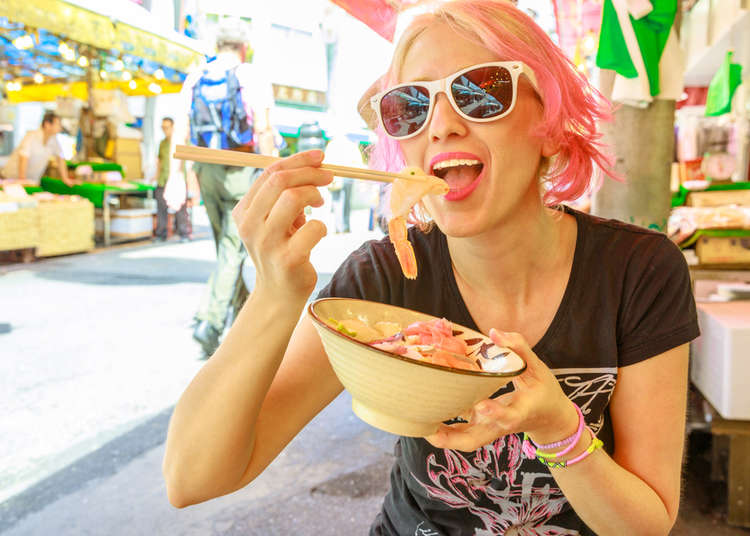
Japan is famous for a lot of things, and Japanese seafood is definitely one of them! Surrounded by bountiful oceans in every direction, the country has brought forth amazing seafood creations, both modern and traditional.
Sushi, while undoubtedly the famous one, is but one dish of many Japanese seafood specialties – but what exactly goes into these dishes? What do Japanese fishermen generally have in their nets and what tasty marine treats await on seafood restaurants’ menus all over Japan?
Here are 10 must-try Japanese seafood varieties, for foodies and beginners!
1) Unagi – Japanese Freshwater Eel
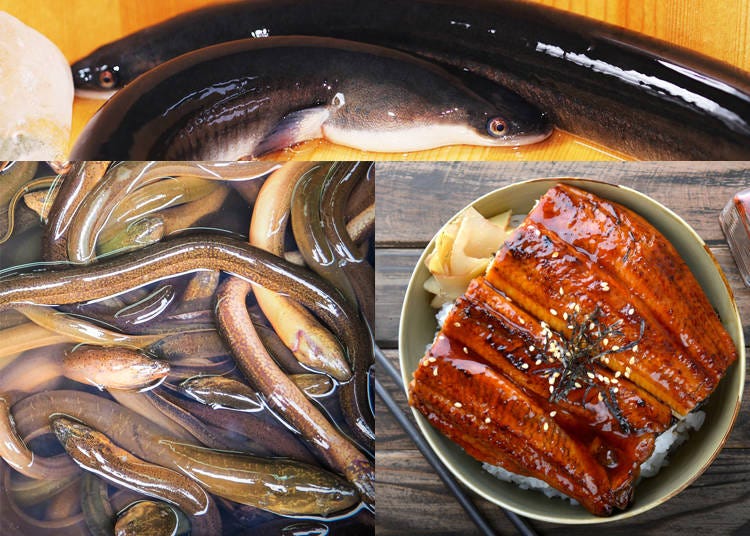
Unagi is eaten since a long time in Japan. It is preferably sliced, grilled, and served on a bed of rice as “unagidon” with rice in a round bowl, or “unagi no kabayaki,” which is just the grilled eel on a plate.
Another dish is called "unaju," which is a layer of rice in a lacquered box topped with eel.
Many people compare the taste of unagi to that of chicken, because of its somewhat dense consistency. Eel has a reputation of being a summer food because it is said to fend off exhaustion from heat, so its prime time is during summer.
Unagi specialty restaurants serve it year-round, however, and because it is grilled, it’s an excellent choice for seafood beginners. The only downside: unagi is fairly expensive.
- Vitamin B
- Vitamin A
2) Uni – Sea Urchin
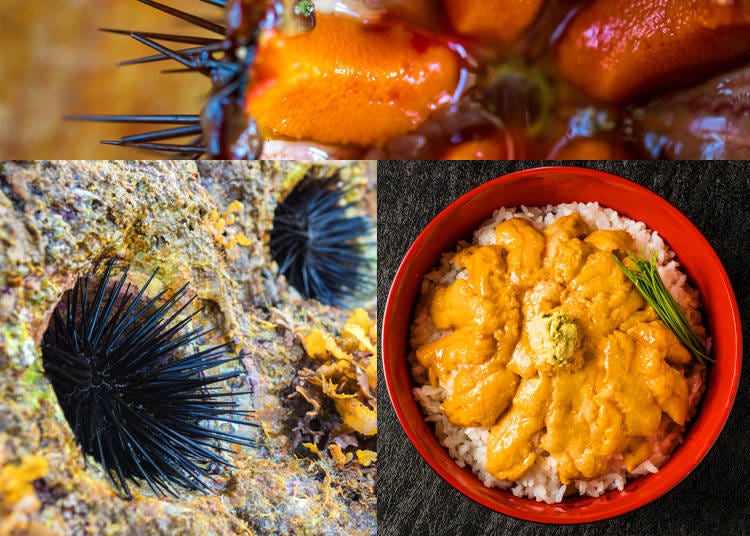
Uni actually refers to the edible gonads of sea urchin and is considered a delicacy in Japan! Generally, uni is enjoyed raw as sashimi or as a sushi topping and tastes best with a bit of soy sauce and wasabi.
The taste is sometimes rather briny and its creaminess might surprise many a foodie, and even in Japan, uni is often considered an acquired taste. If you want to try it for yourself, uni is on the menu of basically every Japanese seafood and sushi restaurant and market all around and is said to taste best in Hokkaido.
- Protein
- Zinc
3) Shishamo – “Willow Leaf Fish”
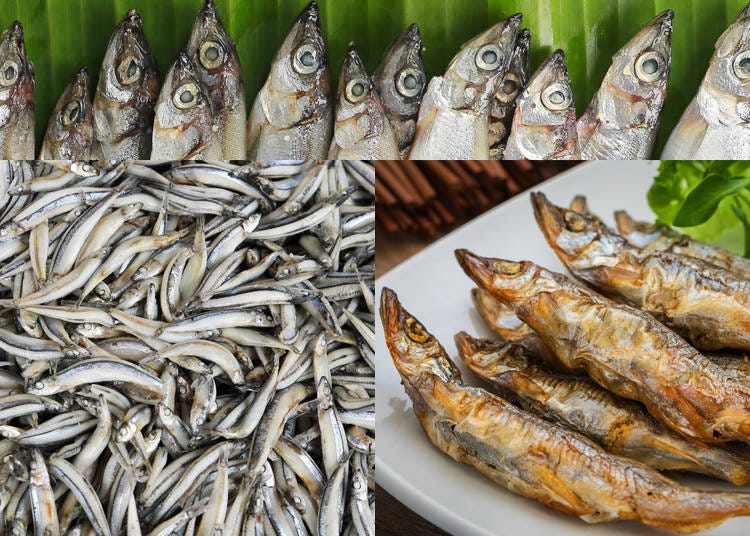
Shishamo is a small saltwater fish that resembles a willow leaf, which is the direct translation of the little fish’s name.
They are usually grilled or fried with the roe still in the fish, making for a surprise when biting into them! As a very popular izakaya dish with a mild taste and exquisite crispiness, enjoy them with a cool glass of beer. People who aren’t fans of roe might want to stay away from shishamo – everybody else, give it a try!
- Vitamin B
- Selenium
4) Maguro – Bluefin Tuna
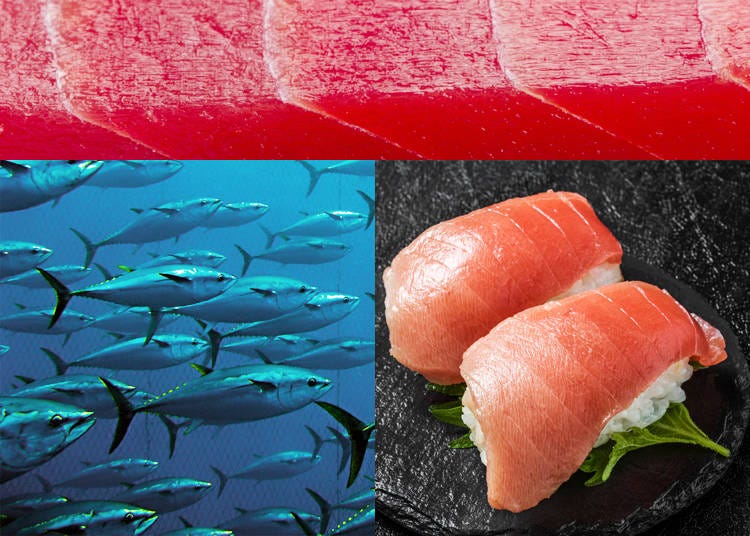
Maguro is a Japanese seafood delicacy that is as tasty as it is versatile. Its meat is classified in different kinds: akami (lean meat from the sides), toro (fatty belly), chu-toro (fatty side), o-toro (fattiest underside).
One of Japan’s most popular sushi toppings and sashimi, maguro can fetch a very high prize on fish markets. This is an absolute must-try when in Japan and suitable for pretty much everyone, so head over to the nearest sushi restaurant!
- Potassium
- Vitamin A
5) Ika & Tako – Squid and Octopus
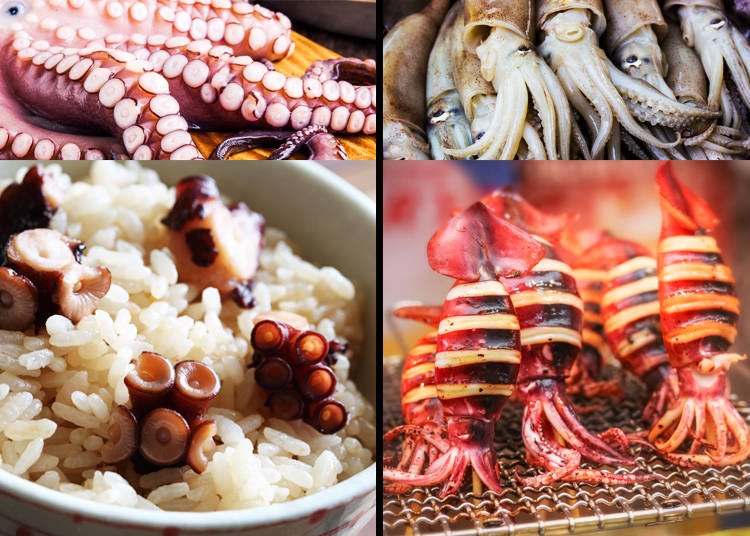
Ika is squid or cuttlefish, while tako refers to octopus.
As for ika, the mantle generally is the part that is eaten, and the somewhat transparent meat has a mild flavor and firm texture. As sushi and sashimi, ika is generally enjoyed raw. Dried squid, however, is a popular, healthy snack that you can buy in every convenience store!
- Potassium
- Calcium
Raw tako, on the other hand, is a fairly rare sight. In general, steamed octopus is used for all kinds of sushi, sashimi, and other Japanese seafood dishes – if the color of the skin is purple, you know the tako has been steamed. Grilled versions are also a popular menu item.
- Vitamin B
- Protein
6) Hotate – Scallops
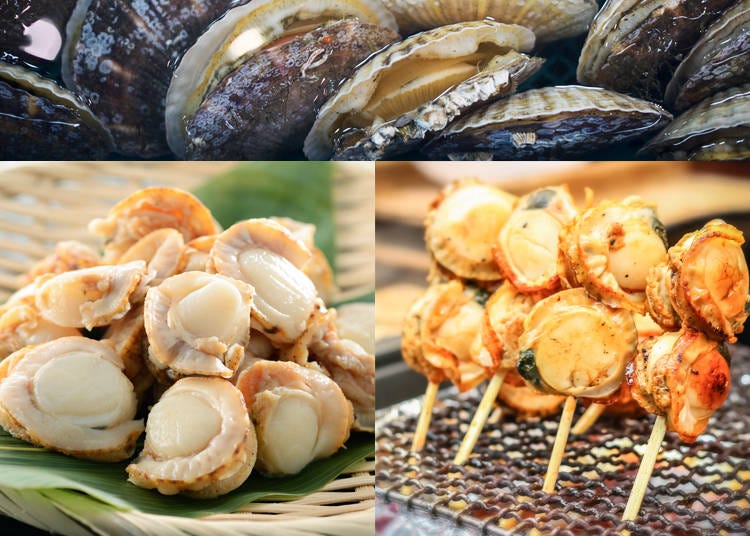
While scallops are a beloved shellfish all around the world, Japan likes to enjoy its hotate raw on sushi and as sashimi.
In teppan (table grill) restaurants, they are also a very popular dish and make for an excellent grilled delight. The shellfish has a soft, sweet taste and is a safe choice for everyone who’s a bit suspicious of seafood, even in its raw state.
- Magnesium
- Iron
7) Fugu – Pufferfish
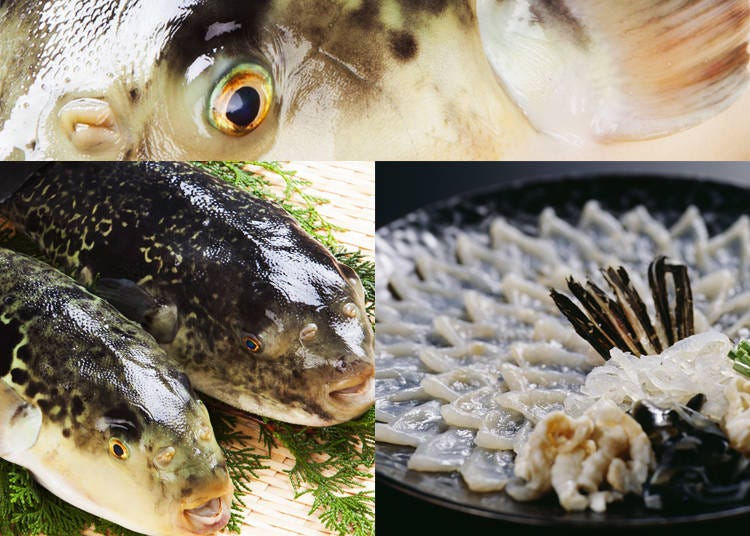
Ah yes, the enigmatic, dangerous fugu is notoriously poisonous! For everyone who wants to test their courage and try real pufferfish, visit Japan in winter – then it’s fugu season.
Handled as a delicacy, pufferfish actually has a very mild taste and is generally served raw. Please do make sure to eat it at a certified restaurant, as a pufferfish's poison shuts down your nervous system and you really don’t want that to happen.
- Vitamin B
- Vitamin D
8) Ikura – Salmon Roe
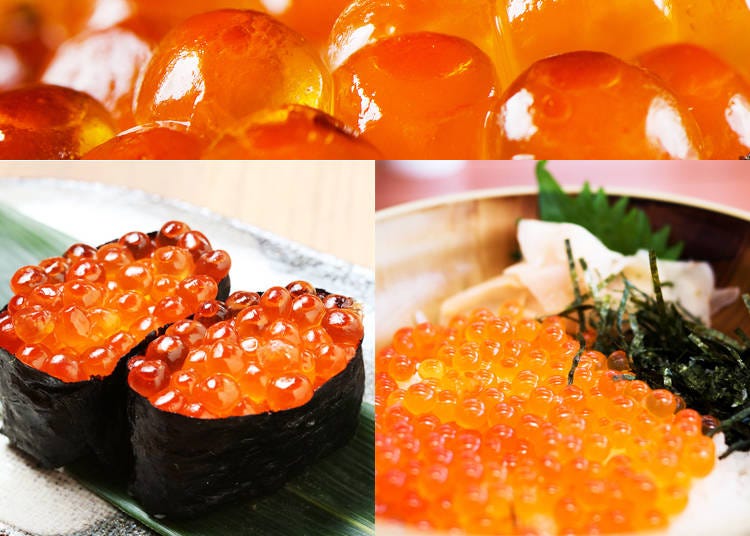
Ikura, the bright orange salmon roe, is a favorite topping of sushi and rice bowls. Also referred to as “red caviar,” ikura is commonly eaten and not considered a luxury food at all – if anything, it’s a Japanese seafood staple that belongs in every “kaisendon,” or seafood bowl.
Salmon roe has a fresh, salty, and mildly briny taste to it and we do think it is a good seafood for beginners – try a tablespoon, for example at the Tsukiji Market right from a seafood stall, and see how you like it!
- Vitamin B
- Vitamin D
9) Kamaboko – Fish Cake
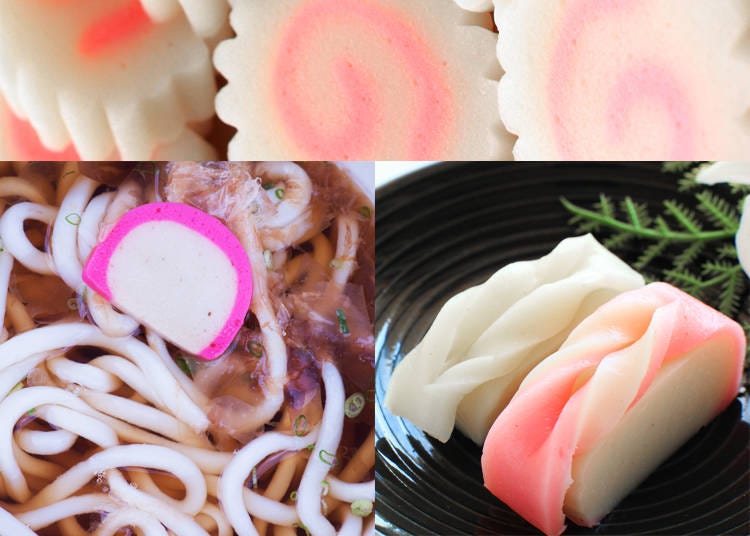
Kamaboko is a “nerimono,” or fish paste product. It is made from fish that is first pressed, then steamed, and thus has a springy texture and only a slightly fishy taste to it. The fun thing about kamaboko is that it comes in all sorts of shapes and colors, but you might know it best with a purple swirl in the middle – that particular kind is called “Naruto” and a staple ramen topping. Kamaboko can be bought at every seafood market and in every supermarket.
- Protein D
- Vitamin D
10) Ebi – Shrimp

Shrimp might not sound too exciting at first, as you’re likely to have it encountered in numerous dishes of all kinds of cuisine.
Japan, however, has a ton of amazing ebi dishes – from raw on sushi, grilled on a teppan, to crispy and juicy as tempura. As long as you’re not allergic, Japan is a true paradise for both shrimp experts and beginners – especially for the latter group, we highly recommend ama-ebi (sweet shrimp) tempura at a proper tempura specialty restaurant.
- Protein
- Omega-3 fatty acids
No matter whether you’re a Japanese seafood veteran or have just begun your gourmet journey under the sea, so to say, Japan is a treasure trove of marine delicacies of every shape and taste.
Raw, grilled, or fried – we urge you to go on a real Japanese seafood adventure with our ten must-try tips! Which one will be your favorite?
Related Articles
- Area
- Category
*Prices and options mentioned are subject to change.
*Unless stated otherwise, all prices include tax.
Popular Tours & Activitiess
Recommended places for you
-
Appealing

Noboribetsu Onsen
Hot Springs (Onsen) & Bath Houses (Sento)
Noboribetsu / Lake Toya
-

Sapporo Clock Tower
Landmarks
Sapporo / Chitose
-

Niseko Village Ski Resort
Skiing & Snowboarding
Niseko / Rusutsu
-
Appealing

Rukku and Uohei
Izakaya
Sapporo / Chitose
-

LakeAkan
Rivers, Lakes & Canyons
Abashiri
-
Appealing

Shiroi Koibito Park
Theme Parks
Sapporo / Chitose
-
Ad

Japan’s Land of Yokai Monsters and Spooky Stories! A Deep Journey to Mysterious San’in (Tottori & Shimane) for Seasoned Travelers
-
Ad

What Makes Japanese Yakiniku So Darn Good? Guide to Cuts, Heat, and Wagyu Know-How
-

Top 3 OSHI MAPs for the Best Matcha and Sweets in Tokyo
by: Guest Contributor
-

To the Holy Land of Kawaii! Odakyu Tama Center Station Is Becoming a Dreamy Sanrio Wonderland
by: Guest Contributor
-

Where to Buy a Japanese Kitchen Knife? Why Travelers Choose MUSASHI JAPAN's 14 Stores in Tokyo, Kyoto, and Nara
by: Guest Contributor
-

Farewell, Heavy Suitcases! Keisei Ueno’s New Service Makes Your Last Day in Tokyo Totally Hands-Free
by: Guest Contributor
-

Hokkaido Lavender Fields: 6 Best Places in Furano to See Japan's Dreamiest Purple Meadows
by: Nobuka Kawashima
-

6 Surprisingly Cheap Things in Japan
-

All-You-Can-Eat Crab & More! 3 Must-Try Restaurants in Sapporo for Fresh Crab Dishes
by: Guest Contributor
-

Ultimate Tokyo Transit Guide: JR, Subways, and Private Railways Explained, Plus Suica/PASMO and Money-Saving Passes
-

Hakodate 2-Day Itinerary for Exploring Japan's Foodie North!
-

Sapporo New Chitose Airport (CTS): Complete Guide to Restaurants, Souvenirs, Shopping & More!
- #best sushi hokkaido
- #things to do hokkaido
- #best ramen sapporo
- #what to bring to japan
- #new years in tokyo
- #what to buy in ameyoko
- #japanese nail trends
- #what to do in odaiba
- #onsen tattoo friendly tokyo
- #daiso
- #best sweets otaru
- #japanese fashion culture
- #best nature furano
- #japanese convenience store snacks
- #best japanese soft drinks













